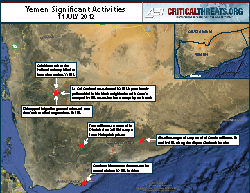 |
Today’s suicide bombing in Sana’a, the second in two months, underscores the challenges faced by the country’s nascent government in restoring stability and security in Yemen. Last month, Yemeni security forces regained control of southern regions held by Ansar al Sharia, the insurgent arm of al Qaeda in the Arabian Peninsula (AQAP). AQAP’s ability to conduct asymmetrical attacks has not been significantly reduced, however.
A suicide bomber attacked Yemen’s Police Academy in Sana’a, the capital. The attack occurred at 1:30pm local time in Sana’a when the police cadets were coming out of class. At least nine people were killed in the blast, according to Yemen’s Interior Ministry. Some sources are reporting that over 22 people were killed. In May, al Qaeda in the Arabian Peninsula (AQAP) targeted troops rehearsing a military parade in Sana’a, killing close to one hundred soldiers.
Yemeni security officials have been targeted by car bombs. In the past week, at least two assassination attempts have been made in Sana’a: a bomb planted in the car of Lt. Col. Mohammed al Qudami, an intelligence officer, killed him on July 2, and two days later, Saleh al Mustafa, the police chief in Mathbah neighborhood in Sana’a, exited his vehicle moments before a car bomb detonated. The attacks are similar to targeted assassinations carried out by AQAP in the past.
Tensions prevail within Yemen’s military. Soldiers kidnapped the commander of the 62nd Republican Guard Brigade, Brigadier General Mural al Awbali, on June 28. The troops identified themselves as loyal to the revolution – Awbali is allegedly close to former President Ali Abdullah Saleh’s son, Ahmed – and complained that their salaries had been cut. Awbali was released on July 8 after tribal negotiations. Yemen’s defense ministry also reported that two army officers have been charged with cooperating with militants in a May 14 attack on Yemen’s main oil pipeline.
Yemen’s Interior Ministry reported that two AQAP militants were arrested in Dhaleh governorate. The militants, Naser Ismail Ahmed Mutahar and Haitham Hasan Afifi, were part of a group of five militants that escaped from prison in Hudaydah in late June. Mutahar allegedly participated in the September 2008 attack on the U.S. Embassy in Sana’a.
Airstrikes continue to target al Qaeda-linked militants in Yemen. Reported U.S. airstrikes struck two vehicles carrying suspected militants in Bayhan district in Shabwah governorate on July 3, killing at least four militants. Two were identified as senior members Fahd Saleh al Anjaf al Harithi and Hassan Ali al Ishaqi. Yemeni airstrikes on July 4 killed at least three militants in the same region, along the Abyan-Shabwah border.
Southern Movement demonstrations turned violent on July 7. Demonstrators were marking the 18th anniversary of the fall of Aden during the 1994 civil war across the south. Yemeni security forces fired on demonstrators in Aden, killing at least three civilians and injuring 12 others. One person was killed in Sayun in Hadramawt governorate. Clashes were also reported in al Mukalla, the capital of Hadramawt, but no casualties were reported.
Please sign up for the Quick Take to receive these updates by email.
← PREVIOUS |
NEXT → |
